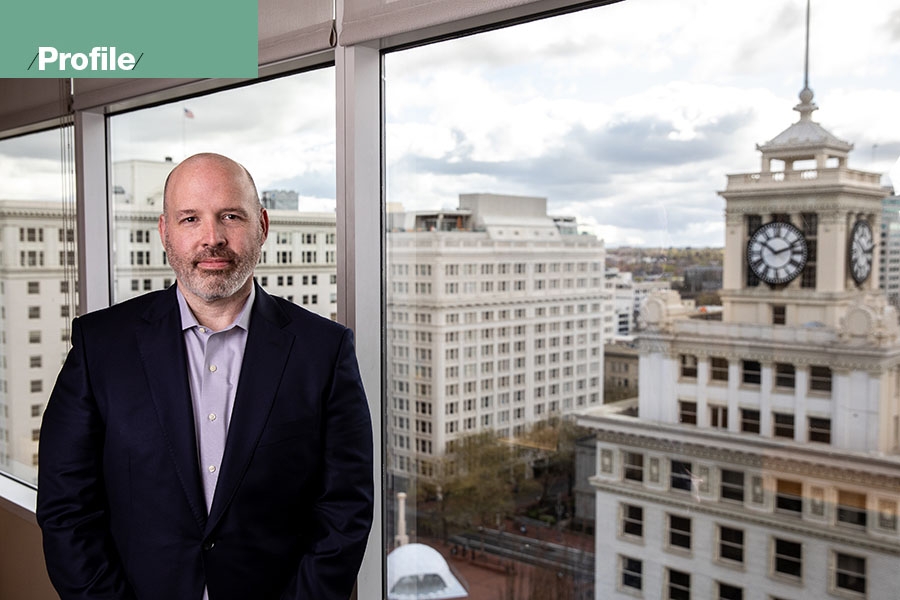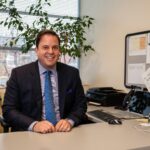New Moss Adams chairman and CEO Eric Miles says volatile business climate is the new normal.
Eric Miles has a joke about working at Moss Adams, the 109-year-old accounting firm where he has spent much of his career.
“I’m either risk averse or I love it at Moss Adams — and it is the latter,” Miles tells Oregon Business. “It’s just been a place where you have something you’re passionate about, you go after it, and the firm supports that.”
Miles started working for the firm in 1998, shortly after graduating from college at Pacific Lutheran University in Parkland, Wash., outside of Tacoma. He left to attain a master’s in business administration at Purdue University, not thinking he would come back to Moss Adams.
He was wrong. He was recruited into the firm’s consulting division and has served in a variety of roles since, most recently as consulting managing partner. And on April 1, Miles became Moss Adams’ new chairman and CEO.
The firm announced Miles’ selection last September. He replaces Chris Schmidt, who retired at the end of March. Schmidt had served as chairman and CEO of the firm since 2013.
“Eric’s an experienced, compassionate leader who has a proven track record of helping both the firm and our clients navigate and respond to change,” Rebecca Pomering, Moss Adams’ chief practice officer, said in a press release announcing Miles’ move into the CEO role. “His ability to foster a culture of agility in an age of constant disruption will be integral to the firm and its clients.”
It’s a challenging time to be stepping into any new leadership role, Miles says, even one in an organization whose culture he knows well.
“You can look at the pandemic, you can look at inflation, you can look at what’s going on in Ukraine. All of these issues are what we talk about with VUCA: volatile, uncertain, complex and ambiguous,” Adams says. “My big emphasis with the firm is getting us to better be able to deal with that type of world, because I don’t think it’s going to slow down. It’s only going to accelerate.”
Another way to put it, he adds, is that the pandemic has “compressed five years of change into a year or two.”
So the focus for the next three years, Miles says, is to encourage staff to “get more and more sensitized to the needs of our clients.”
“Public accounting is an odd profession in a way in that we train people to be experts. In today’s world, to be an expert, you have to have a very narrow lane of knowledge and go very deep,” Miles says. “The consequence of that is, you have a hammer, everything looks like a nail.”
But many clients’ business problems are “varied, they’re multidisciplinary,” he adds, often requiring the help of multiple experts.
Because of that, Miles says leadership is working to train people in what has been called T-shaped expertise: “You have a depth here, but at the top, you have awareness that you don’t have to have all the answers. You have to have awareness that you can bring in your team.”
That’s hard for accountants, who want to be experts, but Moss Adams also acts as a consultancy — though Miles is quick to point out that the firm doesn’t do any consulting work that doesn’t tie back significantly to its core accounting work.
Moss Adams started in Seattle but now has 25 offices, including three in Oregon: one in Portland, one in Eugene and one in Medford. (Most are situated in the western United States, but the firm’s website also notes that the company is recruiting for a “global capability center” in India.)
As of December 2020, according to data submitted to Oregon Business, the firm reported 144 certified public accountants. According to additional information from Moss Adams, the firm employs 3,676 people total and grossed $820 million in 2020.
Miles says the firm’s clients range in size from large public corporations to small, mom-and-pop operations and include higher education institutions as well as not-for-profits.
“Our sweet spot is that middle-market company. Maybe it’s owned by private equity, but more likely it’s owned by family or an individual. So that’s our bread and butter,” Miles says.
The company serves nine “industry categories,” including food and beverage, health care, and technology — with tech being its largest single sector.
Serving a diverse range of clients also means addressing a wide variety of problems, he notes. Clients in food and beverage have workforces largely considered essential, whereas other workspaces — including Moss Adams — pivoted to remote work. For an accounting firm, that creates specific challenges, like making sure the correct tax paperwork is filed for employees living in other states.
And that shift has bled into other, more basic aspects of how companies operate and treat their team members. That’s been true within Moss Adams, where staff have had to evaluate the best ways to operate as a fully remote workforce.
“We need to make time to connect with one another, we need to be deliberate in our use of time,” Miles says. “We could fill up our days with back-to-back Zoom calls. But is that the highest and best use of our time? Are we clear on why we’re connecting?”
And clients have, similarly, expressed that they want to be more “clear and deliberate” about what they want to accomplish.
Miles lives in Northeast Portland with his wife, an assistant U.S. attorney, and 7-year-old twins. He says during the pandemic they’ve been able to “push pause” on their working lives during periods when the other is busy. For example, when his wife is in trial, he can dial back his responsibilities at Moss Adams to focus on caring for his children.
Beyond that, he says his personal life is consumed with “the normal Oregon things”: skiing, hiking and visiting family. He’s also an enthusiastic chess player and reader.
At work, he notes, the next few years will not be about hitting numeric targets but about cultivating the people who work there.
That includes diversity, equity and inclusion work that he hopes will not just be “performative activism” but “more deeply substantive, like actual change.”
“Overall, our desire is to reflect the communities, our targets are to reflect the communities we operate in. So in Oregon, our targets look different than our office in Dallas,” Miles says. He adds that the firm’s largest success has likely been with a “Form W” initiative to increase the percentage of female partners.
“If we hit a target, we move the target. I think this is a test of perseverance,” Miles adds.
And the DEI work is also part of a larger push to ensure Moss Adams is the best possible workplace in its field.
“It’s absolutely true that the more engaged our people are, the happier they are, the more equipped they are from a learning and development perspective,” Miles says. “It’s a direct correlation to how happy our clients are and how much our financial performance hits our targets. So I want to be the employer of choice for accounting types and consulting types.”
To subscribe to Oregon Business, click here.







